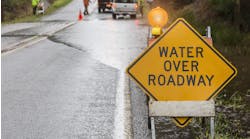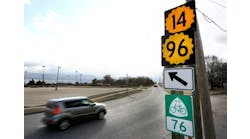As a part of the Superpave mix design system, gyratory compactors are important in defining the mix characteristics to be achieved in production. It is estimated that contractors and agencies have spent over $50 million in the purchase of these devices from different manufacturers. There are currently eight approved models of gyratory compactors. It is important that these devices provide consistent results from one to another, because results from contractors' mix designs are used to provide construction control and are subject to agency verification. A lack of consistency can result in substantial and needless penalties and a mutual distrust between contractors, testing firms and agencies.
Angle validation
When first implemented, the requirement for the gyratory compaction procedure specified that an angle of 1.25° be maintained, and this was relative to the outside of the sample mold. It has come to light that different brands of gyratory compactors may yield different compaction results in spite of having the required external gyratory angle. These compaction differences may result in a design air void content difference of up to 1%, and a change in asphalt content of up to 0.4%. The problem is that different brands or models of compactors have different levels of compliance (give) in their frames. This lack of consistency in compliance is responsible for a difference in the internal angle (inside the mold) where the specimen is being compacted.
In order to address this, a Dynamic Angle Validator (DAV) was developed by Test Quip Inc. for the Federal Highway Administration. The DAV allows the internal angle of different machines to be checked and subsequently adjusted. American Association of State Highway & Transportation Officials (AASHTO) standards now allow a state agency to choose either external- or internal-angle calibration. It is recommended that the calibration be done for the internal angle if different brands or models of gyratory compactors are being used. The cost of the DAV is around $9,000.
Dr. Kevin Hall of the University of Arkansas has led the task group effort to examine the ruggedness of the method. At this time, it appears that the ruggedness of the test method is not affected by temperature, size of aggregate, position of the measuring device in the mold or number of gyrations. It also appears that the method is independent of compactor brand.
Just as important as angle calibration is the issue of gyratory compactor maintenance. Worn molds, bearings, etc., will result in a gradual drift in results over time. Regularly scheduled maintenance is a requirement of the AASHTO accreditation process.
The process for implementing the angle calibration procedure will vary according to local agencies and contractors, but it is important that both industry and agency representatives be involved. Detailed laboratory procedures for calibration, logistics for carrying out inter-laboratory comparisons and within- and between-laboratory tolerances all need to be defined, using the AASHTO method as a starting point. It is useful to note that since the state of Maine has instituted the use of the DAV there were disputes on only 1.5% of 2,000 split-sample test results during 2002.


